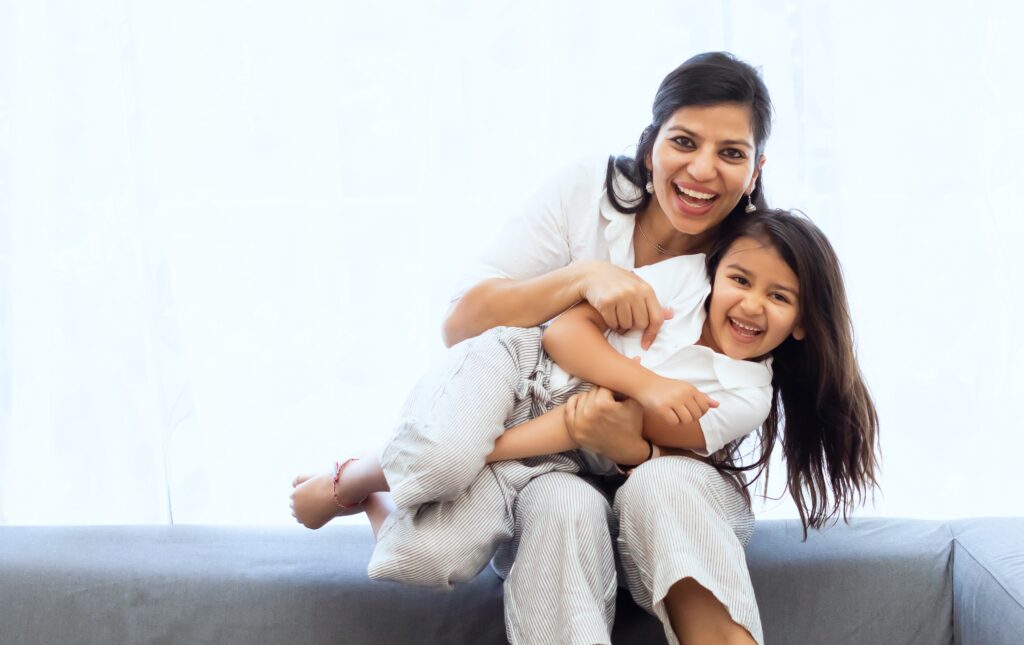
While it is always important to remember that parenting is far from the sole determinator for a child’s mental health, there is a wide range of research that connects parenting practices and parental behaviour to mental health outcomes in children and adolescents (e.g. Rose et al., 2018, Clayborne et al., 2020). Although there are still many unanswered questions and findings regarding some parenting practices remain heterogenic, a general association between parenting and child mental health is indisputable. If you are interested in a detailed examination of parental factors and internalising problems in adolescence I recommend reading this 2014 Mental Elf blog by Nikki Newhouse.
In their 2021 paper, Clayborne and colleagues aim is to find out if the negative effect of prenatal maternal stress on child mental health can be reinforced or buffered by mothers’ parenting practices, whilst also exploring sex differences in this relationship.
The authors present the following three main questions for their research:
- How does prenatal maternal stress relate to children’s internalizing and externalizing symptoms during childhood?
- Does mothers’ parenting have a moderating effect on this relationship?
- Are there differences in the effect of prenatal stress and parenting between girls and boys?

Research suggests that prenatal maternal stress can have an impact on their offspring, but what effect do maternal parenting behaviours have on this relationship?
Methods
The data analysed for the study stems from the Norwegian Mother, Father and Child cohort study (MoBa). The authors of this paper selected 15,963 mother-child dyads based on the availability of their responses on relevant outcome measures.
Only data collected from maternal questionnaires was analysed. Those questionnaires were completed at four different time points:
- At the first two times of measurement during their pregnancies, women were asked to rate the presence of stressors from different domains of their lives. Those stressors included adverse events during the time of their pregnancy, difficulties concerning their employment, selected internalising symptoms and the absence of social support.
- At child age five, mothers were then asked to rate their parenting behaviours on three dimensions: positive parenting, inconsistent discipline, and positive
- Eight years after birth, mothers finally rated their children’s internalising and externalising symptoms.
Structural equation modelling was employed to statistically analyse the associations between prenatal maternal stress, child symptoms and parenting.
Results
Association between prenatal stress and child mental health symptoms
- The authors found a statistically significant positive association between prenatal maternal stress and child symptoms of depression and anxiety. There was no difference between girls and boys.
- Prenatal maternal stress was also significantly and positively related to children’s externalising symptoms regardless of sex. However, the association was stronger in boys for symptoms of conduct disorder (CD) and oppositional-defiant disorder (ODD), while prenatal stress was more strongly related to symptoms of ADHD in girls.
Moderating effect of inconsistent discipline
- Inconsistent discipline had a significant small and positive moderating effect on the association between prenatal stress and symptoms of depression (but not anxiety).
- Only in boys, inconsistent discipline was also found to moderate the association between prenatal maternal stress and both ODD and CD.
Moderating effect of positive involvement
- Positive parental involvement was identified to have a small negative moderating effect on the association between prenatal stress and ADHD in girls. The effect was not found for boys.
Moderating effect of positive parenting
- No significant moderating effect of positive parenting was found.
All interaction effects remained significant when conducting sensitivity analyses that adjusted for maternal postnatal depression and stressful life events.

This study found an association between prenatal stress in mothers and later anxiety and depression in their children.
Conclusions
This study supports the previously found association between mothers’ prenatal stress and higher levels of internalising and externalising symptoms during childhood. As expected, the authors found a sex difference for externalising symptoms. Contrary to the authors’ expectation, the association looked the same for boys and girls when it came to internalising symptoms.
Concerning their moderation analyses, the authors concluded:
Our findings support small interaction effects of inconsistent discipline and positive parental involvement in a manner such that the strength of the associations between prenatal maternal stress and internalizing and externalizing outcomes are amplified when levels of inconsistent discipline are high (or levels of positive parental involvement are low) and vice versa.

This study found that inconsistent discipline and positive parental involvement parenting styles impacted on the relationship between prenatal maternal stress and both internal and external outcomes.
Strengths and limitations
One of the strengths of this piece of research is its longitudinal approach that allowed for predictor, moderator, and outcome variables to be collected at different time points over a total of nine years. Using data from the Norwegian cohort study on a large sample of mothers enabled the authors to conduct rather complex statistical models, including various confounding variables, the examination of sex differences and different moderation effects. In comparison to the few other existing studies examining a similar moderation effect of parenting, the authors also seem to be the first to examine 1) a broad range of prenatal stressors, 2) various dimensions of parenting and 3) both internalising and externalising symptoms.
However, there are some limitations to the study and generalisability of the results, many of which are mentioned by the authors themselves. When interpreting the study’s findings, it is important to keep in mind that all measures were collected only through maternal self-report while paternal reports of parenting practices and children’s symptoms were neglected. 97% of the included mothers were either married or cohabitating with a partner which suggests a strong paternal presence. The consideration of paternal parenting likely adds an important dimension to the understanding of the interplay between prenatal stress and mental health during childhood. Two interesting Mental Elf blog posts on the importance of considering fathers for their children’s mental health can be found here and here.
Another important limitation to the study is the selection bias likely impacting the analysed data. In 2009, the MoBa sample was compared to the population-based Medical Birth Registry of Norway and significant differences due to self-selection were found (Nilsen et al., 2009). Women who were younger than 26, living alone, had more than two previous births and smoked during pregnancy were found to be under-represented in the MoBa sample. Women who supplemented their pregnancies with multivitamin and folic acid were found to be over-represented. I understand that the authors of the current study used Maximum Likelihood estimation to compensate for missing data where possible. However, many mothers had to be excluded from the sample due to attrition or insufficient data on the study-relevant variables, further reinforcing the preexisting selection bias.
Overall, I am of the opinion that the manuscript adds an important bit of research and can serve as a helpful base for further studies on the moderating role of parenting. However, replication of the results, particularly on the basis of more diverse samples, is crucial before we can trust and generalise the moderation effects found by the authors. It would be particularly important to examine the association in families that are likely affected by a higher level of strain and have less resources at their disposal such as parents who are single, of lower socioeconomic status, or have a migration background.

But what about fathers? Measures were collected only through maternal self-report, and so the paternal perspective is missing from this study.
Implications for practice
If replicated, these findings can serve as an additional reason for the implementation of evidence-based parenting interventions that specifically focus on the reduction of inconsistent parenting practices and encourage positive involvement. Prenatal stress could then also serve as an additional selection criterion for families who might benefit from preventive parenting interventions.
Besides the moderation analyses, the study provides further evidence for the association of prenatal stress and children’s subsequent psychopathological symptoms. It therefore emphasises the need for early supportive interventions aimed at mothers who report a high burden of prenatal stressors. The reduction of modifiable prenatal stressors (e.g. lack of social support, work stress, burden of internalising symptoms, substance consumption) would likely have long-lasting positive effects on children’s mental health and might be feasible within the scope of interventions targeting mothers’ well-being. Such interventions could include support groups for pregnant mothers or short-team (maybe even group- or internet-based) cognitive behavioural interventions.

This study suggests the need to implement evidence-based parenting interventions that specifically focus on the reduction of inconsistent parenting practices and encourage positive involvement.
Statement of interests
No conflicts of interest.
Links
Primary paper
Clayborne, Z. M., Nilsen, W., Torvik, F. A., Gustavson, K., Bekkhus, M., Gilman, S. E., Khandaker, G.M., Fell, D.B. & Colman, I. (2021). Prenatal maternal stress, child internalizing and externalizing symptoms, and the moderating role of parenting: findings from the Norwegian mother, father, and child cohort study. Psychological Medicine, 1-11.
Other references
Clayborne, Z. M., Kingsbury, M., Sampasa-Kinyaga, H., Sikora, L., Lalande, K. M., & Colman, I. (2021). Parenting practices in childhood and depression, anxiety, and internalizing symptoms in adolescence: a systematic review. Social psychiatry and psychiatric epidemiology, 56(4), 619-638.
Kingsbury, M., Weeks, M., MacKinnon, N., Evans, J., Mahedy, L., Dykxhoorn, J., & Colman, I. (2016). Stressful life events during pregnancy and offspring depression: evidence from a prospective cohort study. Journal of the American Academy of Child & Adolescent Psychiatry, 55(8), 709-716.
MacKinnon, N., Kingsbury, M., Mahedy, L., Evans, J., & Colman, I. (2018). The association between prenatal stress and externalizing symptoms in childhood: Evidence from the avon longitudinal study of parents and children. Biological psychiatry, 83(2), 100-108.
Nilsen, R. M., Vollset, S. E., Gjessing, H. K., Skjaerven, R., Melve, K. K., Schreuder, P., Alsaker, E. R., Haug, K., Daltveit, A.K. & Magnus, P. (2009). Self‐selection and bias in a large prospective pregnancy cohort in Norway. Paediatric and perinatal epidemiology, 23(6), 597-608.
Rose, J., Roman, N., Mwaba, K., & Ismail, K. (2018). The relationship between parenting and internalizing behaviours of children: A systematic review. Early Child Development and Care, 188(10), 1468-1486.
Sutherland, S., & Brunwasser, S. M. (2018). Sex differences in vulnerability to prenatal stress: a review of the recent literature. Current psychiatry reports, 20(11), 1-12.
Photo credits
- Photo by Alexander Dummer on Unsplash
- Photo by Kelly Sikkema on Unsplash
- Photo by lucas Favre on Unsplash
- Photo by Vivek Kumar on Unsplash
- Photo by Kelly Sikkema on Unsplash
- Photo by Viktor Forgacs on Unsplash
